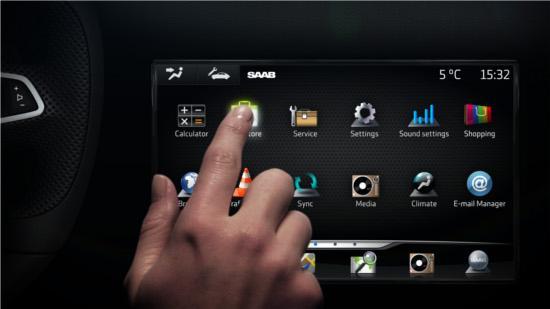
I can remember back when I bought my first vehicle. A '97 Ford Ranger with a step-side bed and a camper shell. All I even cared about was that the truck was a straight drive and that it had working speakers and a CD player. Now, I flail my arms in panic if I have to drive a car without Bluetooth or an auxiliary-in port. One day, we will be looking back at all of these modern in-car features like those much loved 8track players and tape decks of the past. Truth is, it may be sooner than you think.
Several car manufacturers have been experimenting with different ways to better integrate your in-car experience with the rest of your life. I can't think of a better way for them to do so than by adopting the mobile platforms that we so dearly love and implementing them – front and center – in your car's dashboard. As mobile platforms mature, they are beginning to expand beyond smartphones and tablets, and are finding themselves in all sorts of useful places.
Car maker Saab is working on an in-car "infotainment" system called the IQon (pronounced "icon"). Essentially an in-dash, Android-powered, mini computer, it will allow you to get all your emails, view Google Maps, play media, and more straight from your car's dashboard. Pretty neat, huh?
Well, Saab isn't the only one working on in-car units. BMW is toying with BlackBerry and iPhone integration to read emails aloud; Ford is working on getting applications like Pandora and OpenBeak in the car with SYNC AppLink; and OnStar and Chevrolet already teamed up with Android for their Volt application that gives stats on the car's charge level, etc. These are just to name a few, and as the interest grows, other manufacturers are sure to jump on the bandwagon.
Just think about how cool it would be to sit in your car and have Pandora or Slacker radio built-in, to have your car read your emails to you, or to have Google Maps (free and constantly updating maps) in your dash versus the aging ways of last-year's navigation systems. The only problem with how this might work is how you're going to feed the data to your car. Nobody is going to want to pay even more per month for a data plan for their car. This will likely be solved by a Bluetooth connection or a hard wired USB connection with your smartphone. Not too shabby.
It all sounds great, that is, except for the one, large, gaping hole in the plan: the risk we run with of all of this distracting tech being brought into a fast-moving half-ton hunk of steel. Smartphones are distracting enough. Imagine what consequences we will be dealing with if we have our email, Twitter, Netflix, and more, instantly accessible from our dashboards. Fortunately, the great minds behind these technologies have not neglected the thought.
Ford, with their AppLink, plans to limit which app developers can get their hands the SDK. They also plan to implement an AppLink lock-out screen that keeps you from messing with your phone while its connected. QNX, a software company that was recently acquired by RIM, and RealVNC have worked together to create software for Nokia's Terminal Mode that works as an in-car, cross-platform terminal for your smartphone. Their system limits what applications can be used while in the car. With the proper care and precautions, this in-car technology can be pretty safe. In fact, locking you out of your phone will probably keep your more safe than not.
I'm definitely interested to see how far this integration goes and to see what unique ideas the car manufacturers can come up with. To be honest though, I'd be more interested in an in-car PowerMat-like charging solution. Who's with me? Also, what in-car solutions do you think we'll see that utilize mobile platforms?